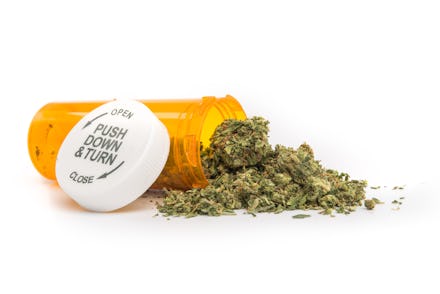You can now get an MBA in medical cannabis

The University of the Sciences in Philadelphia has started an MBA program in medical cannabis, which the school reports to be the first of its kind, according to WHYY. USciences is among a growing number of universities that have begun offering cannabis courses and degree programs — but some question how they’ll address the legal weed industry’s role in repairing the War on Drugs’ harms to Black and Brown communities.
Students enrolled in USciences’ Cannabis Industry Option can sign up for four elective courses which include an introduction to the medical marijuana industry, finance and regulation, and marketing and sales, according to a statement from the university. A project-based course will give students the opportunity to draft a business plan or bring a product to market. The Cannabis Industry Option will admit students through December 1 and kick off classes in spring 2020. The program is part of USciences’ pharmaceutical and healthcare business MBA, which includes a mix of online classes and visits to campus every now and then.
Cannabis still qualifies as a Schedule 1 drug, the category with the most stringent restrictions on supply, access, and research, per Vox — but WHYY reports that many expect it to be rescheduled, which would enable more biomedical research on it. Since students in the Cannabis Industry Option will get to take pharmaceutical research and development classes, they’ll be prepared for this transition, Erica Waldorf, assistant director of USciences’ MBA program, told WHYY.
WHYY notes that Andrew Peterson, executive director of USciences’ Substance Use Disorders Institute, partnered with Waldorf to launch the Cannabis Industry Option partly to fill the void in formalized business training opportunities for prospective ganjapreneurs. Indeed, despite being valued at $13.8 billion last year, the legal weed industry has attracted plenty of applicants — just not enough qualified ones, Quartz reports. “We have one of the biggest industries developing without any trained professionals,” said Jamie Warm, co-founder and CEO of Henry’s Original (a cultivator and distributor in Mendocino County, California) to Quartz.
Indeed, USciences is among a cadre of universities that have begun offering cannabis-focused courses and degree programs to meet this very need as the legal industry matures and more states loosen their restrictions on the substance. (Thirty-three states have legalized medical marijuana, while 10 states and Washington, DC have legalized recreational use.)
For instance, the University of Maryland School of Pharmacy’s master’s program in medical cannabis and therapeutics will begin classes on August 26. In June, Clark University in Massachusetts announced the creation of a certificate in regulatory affairs for cannabis control. This fall, Cornell University’s offerings will include an undergraduate course titled “Cannabis: Biology, Society, and Industry,” Quartz reports. Cornell also plans to start a master’s program with a focus on communicating with industry and media stakeholders next year.
Although the proliferation of such programs is encouraging, many of them gloss over weed’s racist history, Color of Cannabis Conference founder Tauhid Chappell told WHYY. Black and Brown people laid the foundations for the legal weed industry, yet many are blocked from cashing in on it because the War on Drugs disproportionately targeted their communities for weed-related arrests and incarceration. (Black Americans are 3.73 times more likely to be arrested for weed than their white counterparts, per the ACLU.)
Today, white Americans vastly outnumber people of color in the legal weed industry. Eighty-one percent of cannabis business owners and founders who answered an online survey were white, per a recent Marijuana Business Daily report. This disparity has brought up the need for the legal weed industry to make reparations for the damage done by the War on Drugs.
“That’s an injustice that needs to be hammered home in every cannabis program,” Chappell told WHYY. “This kind of knowledge can bring a necessary level of sympathy, sensitivity and awareness for cannabis workers, especially those who interact with patients, consumers, and other workers of color in the industry.” He added that USciences’ program doesn’t have concrete plans to recruit communities disproportionately impacted by the War on Drugs. As more of these programs emerge, the issue of reparations will likely only keep coming up, reflecting a larger question of how to ensure that legalization is not only profitable, but equitable.